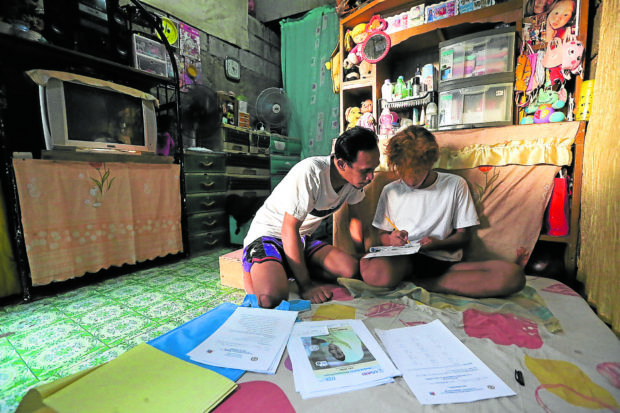Alternative Learning System Act a step to making education inclusive – group

(FILE) Alan Verdan guides his son, 15-year-old Ivan, through a 7th Grade math subject inside their home at a low-cost housing area in Barangay Nangka, Marikina City. The subject is included in the printed module learning packet provided by Nangka High School for youth studying under the Alternative Learning System. Verdan said he decided to personally oversee his son’s lessons to help him focus while his wife takes care of their youngest child. Today is the first day of regular classes.INQUIRER FILE PHOTO/LYN RILLON
MANILA, Philippines — A child rights advocacy group has lauded the enactment of the Alternative Learning System (ALS) Act, which they said is a step towards achieving inclusivity of education, especially for vulnerable sectors and amid the COVID-19 pandemic.
Save the Children Philippines said Thursday that Republic Act No. 11510 if implemented properly would provide access to education for children who cannot attend regular classes due to various circumstances.
President Rodrigo Duterte recently signed the bill into law, which mandates the Department of Education (DepEd) in partnership with the Department of Budget and Management and the Civil Service Commission, to create teaching positions and corresponding salary grades to boost the existing ALS Teachers Program.
READ: Duterte signs Alternative Learning System Act
This would help out-of-school youth — or young people who have opted out of their studies due to several problems like poverty, disability, geographical and infrastructure challenges, and ongoing conflict.
“Inclusivity is critical in upholding the right of every child to access quality education that will support the development of their personality, talents, mental and physical abilities and achieve their fullest potential,” Save the Children Philippines chief executive officer Atty. Alberto Muyot said in a statement.
“We welcome the enactment of the law that aims to address education and development needs of children and youth, and opens opportunities for context-specific learning models fit for the intersectional needs of learners,” he added.
According to DepEd, ALS was instituted as a “practical option to the existing formal instruction” — which means that people who lack access to formal education formats can still catch up through this mode.
DepEd said that a lot of Filipino students still drop out of their respective grade levels due to various reasons. As a response to the constitutional mandate to provide every Filipino the right to free basic education, ALS was created to service these individuals.
Recently, ALS enrollment has fallen sharply, due to the COVID-19 pandemic which prevented face-to-face classes. DepEd Secretary Leonor Briones said last October that only 365,569 of the 739,872 students nationwide in 2019 enrolled in the current school year.
READ: DepEd: Enrollees reach 24M or 86% of last year’s total
To ensure that education would be inclusive, Save the Children said that every Filipino student must get the support they need to allow them to catch up and match with their peers — especially during this time that normalcy was disrupted by the COVID-19 pandemic.
“Inclusive education means actively working to ensure that every child, irrespective of gender, language, ability, religion, nationality or other characteristics, is supported to meaningfully participate and learn alongside his/her peers, and develop to his/her full potential,” Save the Children said.
“[…] Children in disadvantaged sectors experience compounding issues on hunger and malnutrition, lack of access to learning, and are the most prone to abuses and exploitation. These are further exacerbated by the risks of COVID-19,” it added.